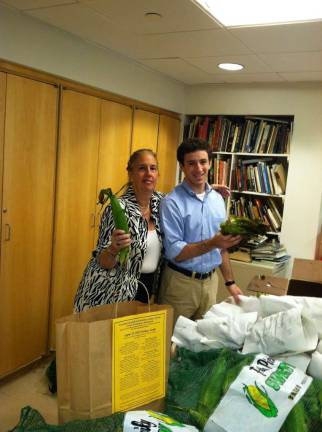Local Seniors Going Green

Upper West Side senior residents are getting fresh, local produce delivered at low costs Last week, local seniors and representatives from West Side senior centers, programs, Naturally Occurring Retirement Communities, the Department for the Aging, the NY Academy of Medicine and GrowNYC's Greenmarkets staff came together on the Upper West Side to learn about the Grow Green Age Well program that brings fresh produce to local seniors. The program began in 2012 and just celebrated its first successful year with plans to expand to more city programs. The program began after City Councilmember Gale Brewer heard from constituents that some residents were not able to benefit from the city's greenmarkets. "As Community Supported Agriculture programs and farmers markets have spread throughout the city, we heard from older Westsiders that they were being left out ? especially those on fixed incomes and those who live alone," said Brewer. "So we decided to do something about this and test something new. And we had tremendous success." "During the summertime, we seniors crave freshness but it gets harder for seniors to walk to the local farmer's market," said Martha Weisberg, a senior Food Bag participant. "It was actually exciting to pick up my first wonderful bag of fresh produce - and, for eight dollars, I received a late summer bounty. To me, making such a wonderful program so accessible and affordable is community action at its finest." The Food Bag Program matches local farmers with local seniors through GrowNYC's Greenmarket Co. wholesale program which provides customized produce delivery to senior centers, food banks, and Meals-on-Wheels. For its first year, the Program served senior centers and organizations in the Upper West Side district. "We're identifying the Program's successes, recommending ways to improve, and releasing the results of a user survey," said Brewer. Together with Age-friendly NYC, Brewer plans to share the Food Bag model with other communities interested in improving access to fresh, affordable food for older adults. Seniors received a bag of fresh local produce with approximately six different fruit and vegetable items for just eight dollars. A free Produce Guide showed how to store the food, what farms it came from, and offered recipes for raw and cooked preparation. Unlike a typical Community Supported Agriculture (CSA) program where members pay in advance for a season, seniors paid only by the week, and only for the weeks they opted to participate. At season's end, seniors filled out a survey asking for their thoughts. The response was overwhelmingly positive: 91 percent indicated they would return for year two, and over 80 percent rated the quality and quantity of the produce as good or great. Among their suggestions for improvement, seniors wanted more microwave-friendly recipes, and easier sign-up for those with mobility challenges.